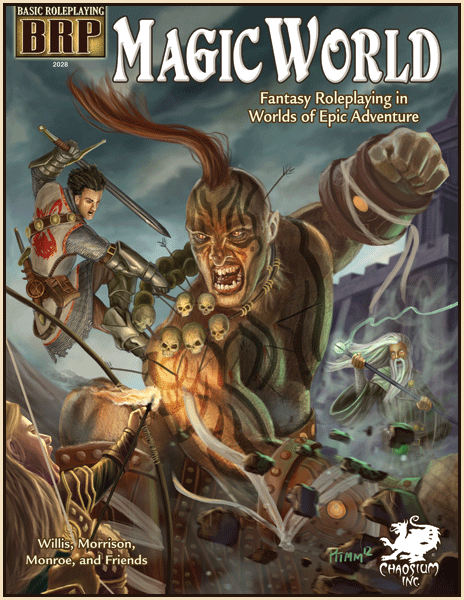Skeletons, by Bob Harvey (Talisman of Death, FF#11)
Before I get round to polishing off the other six Skeleton encounters, I came across a cool little rule in Elric! I've seen rules for adjusting damage to Skeletons based on weapon type - i.e. bludgeoning weapons do more damage, peircing weapons very little, but Elric! has a suitably elegant spot rule. I can't say that I'd ever noticed it before, probably because Skeletons are relegated to a 'Natural Beasts & Generic Monsters Table' at the very end of the bestiary. Anyway, here is the footnote that relates to Skeleton 'armour':
"Does normal attack damage. Destroyed completely by weapon damage roll x4 or less, as rolled on D100: thus damage result roll of 4 needs a D100 result of 01-16, or there is no effect. Include any damage bonus." (p 137)
An elegant spot rule, if inelegantly put. I'm not sure what the first sentence means, but given that Skeletons have only 5-6HP I have assumed this means that armour (which in Elric! reduces damage according to a dice roll) does not reduce the damage roll for purposes of calculating the percentage chance of destruction. If attacks also do HP damage, this rule isn't half so cool - most Skeletons would be 'killed' long before they are shattered. However, reading it my way, this rule requires no increase in bookkeeping (indeed, it requires less, as we're no longer tracking Skeleton HP) to achieve an interesting effect. I don't see why this rule couldn't be applied to Skeletons in most fantasy games.
I certainly could see myself using this in a D&D/OSR game. If I wanted to make 'tougher' Skeletons - such as the Skeleton Champions in The Cursed Holmgang, I would improve their AC rather than fiddle with the multiplier that is used to derive the percentage chance of destruction. As HP doesn't matter (at least not with regard to crude weapon attacks), improved HD would be used to increase their ability to hit.
If I wanted to complicate things further, we could alter the multiplier by weapon type. For example, piercing weapons have a x1 multiplier, slashing a x3 multiplier, and bludgeoning weapons a x5 multiplier. Or something like that.
(Credit for this rule is due to one or more of Willis, Watts, Morrison, Pursell, Shirley, and Shaw, authors of Elric! I'm not sure if there are antecedents for this rule to be found elsewhere.)
Incidentally, Magic World (which is largely Elric! reskinned, though the bestiary is drawn from RQ3), does have Skeletons taking HP damage in the normal way. I think. It has Skeletons taking no damage from thrusting weapons (except on a Special or Critical) and being automatically destroyed when it takes a Major Wound. Except the MW bestiary doesn't give us a HP score from which we can derive the Major Wound threshold (a product, presumably, of an incomplete translation of material from RQ3, which had hit locations, to MW, which has total HP scores). Going by SIZ alone (average 13), we could guess that Skeletons might have 13 HP and a Major Wound threshold of 7. However, Elric! gives Skeletons just 5-6 HP, based on (SIZ+CON)/2. If this was transferred straight over to Magic World it would mean that the Major Wound threshold would be just 3 - so pretty fragile! Shards of bone everywhere!












.jpg)

































































